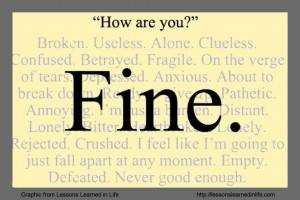It’s a holiday weekend, which usually means it’s a time for friends and family to gather. Even if you’re invited to join in, you may have some tough moments ahead. Despite the merriment and companionship, it’s glaringly obvious to you that your partner is missing from the picture. You can’t help but think about how he would have been enjoying himself, and you so wish he could be here to join in the fun.
However, not wanting to be Debbie Downer, when someone asks, “How are you? – you’re most probably going to answer with the socially expected reply, “I’m fine; how about you?”
While How are you? is such a simple question for most, for the bereaved, this question does NOT have a simple answer, such as the one I gave above. In fact, as shown in the graphic below, although you might say I’m fine, if you go beneath the surface, “fine” may have a myriad of emotions bubbling below it.
If you get upset when people ask how you are, but seemingly don’t wait to hear the answer, here are some thoughts for you to consider.
Generally speaking, when two people get together or speak on the phone, an initial question is often “How are you?”
Although you might find this question glib or feel that the person really doesn’t want the “true” answer, it’s very often just asked on auto-pilot – a seemingly polite query upon greeting someone before delving into a real conversation. Even though the other person may know this is a tough question for a widow, before she knows it, the words are out of her mouth and she probably feels bad about asking.
It’s NOT fair, but the bereaved (who are the ones really needing help and support) need to help those who are uneducated about grief.
Instead of being hurt by this usually innocent question (because you know you can’t truthfully answer “fine” and don’t really want to explain your deep emotions), let the person gently know how difficult it is for you to answer.
Of course, depending on to whom you are speaking (and the situation), use your own discernment on whether or not it is an appropriate time to delve deeply into what the expected answer of “fine” really means to the bereaved. I think that when you truly explain how you feel, you’ll find most people quite receptive and understanding.
Learning to cope with grief is a learning process for both the bereaved and those who love and care for her.



you nailed it sister